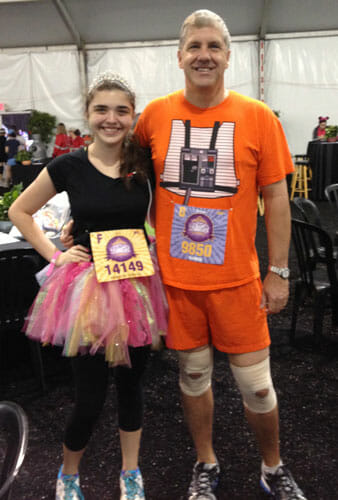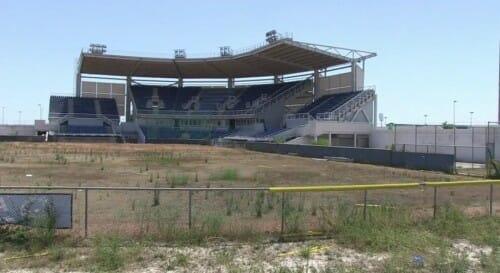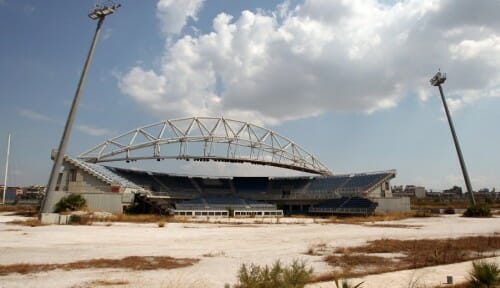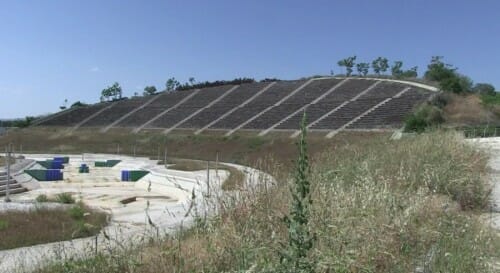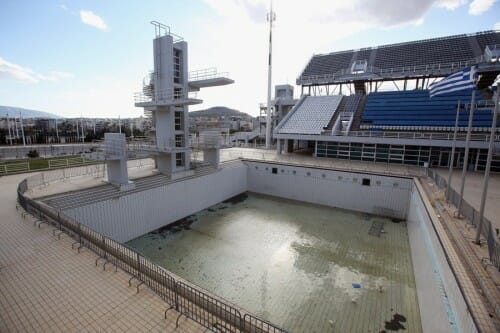Update: This is part 1. Part 2 is here.
I sit here near Brookhaven on Long Island hiding in my hotel room as I don't want to make my son any more nervous in performing the skill evaluations at the baseball showcase camp he is attending. Two hundred nervous kids and four hundred nervous parents is something I can avoid (though for parental hyperactive competitive frenzy, nothing in my life has yet topped an elementary school chess tournament in Seattle). Later today the format shifts to playing games and I will go over and watch that.
As I sit here, I might as well share with you some of the lessons we have learned in trying to land a spot playing college baseball. I am not sure you should even listen to me, as I knew nothing about this 5 months ago and we still don't know if our son will be successful, though we are gaining confidence.
First, if your kid is a total stud, he may be scouted in high school, either on his school team or on summer and fall teams built for that purpose. If so, great. But just because your kid has never been seen by a college scout, or goes to a school that is not a traditional baseball powerhouse, he is not somehow doomed. Our son certainly has never seen a scout and goes to a school that almost never produces college baseball players. Worse, he plays varsity soccer and basketball so he can't even join a fall scouting team. This probably rules him out for high-powered division 1 programs like ASU or Texas. But there are a ton of schools out there who are likely not going to get even one scouted player.
My son is looking at small liberal arts colleges that tend to play division III (Williams, Amherst, Vassar, Pomona) and a few smart-school division I teams (e.g. Princeton). He has a different equation than the top division 1 athletes. They are hoping their skills will get them a scholarship and acceptance at a school that can offer them exposure to the pros. My son is hoping his skills will put him over the top at a very selective school that is brutally hard to get accepted at, even with good grades. And of course, he just loves to play baseball.
NCAA recruiting is a morass of sometimes non-intuitive rules. And the rules are different for different size schools (e.g. div III vs. div I). But the most important thing I can tell you is that your kid has to take the initiative to get in front of the schools. You cannot rely on your coach or school or anyone else. You can begin earlier, but we started around the middle of his Junior year:
2nd Semester Junior Year
Through much of his junior year, I video'd Nic's games, and then he spliced together a 5 minute highlight video. We put that on YouTube, and sent coaches a letter and a copy of the video.
Most schools have an online prospect form they want you to fill out, and you need to do that. You also need your kid to register with the NCAA clearing house -- it takes a few bucks and they want transcripts and test scores.
During spring break, when we visited schools, in addition to the admissions office tour, we tried also to either schedule a visit with or drop by the baseball coach. Some said hi for 5 minutes, some gave him nearly an hour, but its important to show them you are interested. In all of this, it is very important to have your son take the lead. Yes, I know teenage boys and mine is no different than yours, so you may have to poke and prod in the background, but they need to make the contact. In fact, whenever we meet a coach, I introduce myself, and then I leave my son alone with him.
If you take any message away, I would say this, and I have heard this from many people now: The #1 mistake your kid can make is not being proactive enough in contacting coaches. The #1 mistake you as a parent can make is being too involved with the coach -- they want to see what your kid will be like, at college, out from under your parental umbrella. They do not want to deal with your hopes and fears and anxieties as the overbearing sports parent.
Summer between Junior and Senior year
By NCAA or conference rules, at least atthe div III schools we visited, the coaches cannot give your son a tryout at school. We thought we might obtain something like this when we visited, but it is against the rules. So you need to find a forum to play in front of the coach. The best is if that school has a showcase camp. A lot of schools do -- check their athletics web site. The other great choice are camps held by third parties that have coaches from many schools attending. Nic wrote the coaches at the schools he was interested in and asked them, by email, which camps they were attending so he could get in front of them. If they don't answer, try emailing the assistant coaches (many times the head coach has delegated most of the summer scouting to the assistants).
There are a lot of camps nowadays, because certain groups have found they can be money makers. In fact, I would say baseball camp folks fall into two categories -- there are ones run by baseball guys who really care about the kids and the game, but who can't organize their way out of a paper bag. And there are the commercial ones, that may run well, but tend to have way too many boys for the number of coaches and don't seem to care much about the boys. The exception I found was a group called Headfirst, which runs a series of Honor Roll Camps, so named, I think, because they have coaches from a lot of "smart" schools. These guys really care about the boys and run a fabulous camp. If the schools you are interested attend these camps, I would highly recommend them. Sign up early, they always sell out.
Here is how this camp runs, as an example. In the first morning, the boys will do a number of skills workouts for the coaches (who are all on the field in folding chairs taking notes). Outfielders will field four balls and make a few long throws to the plate. Infielders will do the same from shortstop. Catchers will be timed popping up and making the throw to second. Everyone gets timed in the 60-yard dash. Everyone gets to hit 9 balls in batting practice in front of all the coaches. The rest of the two days the boys are organized into teams and play games, which are as much about pitcher evaluations as anything else. At this camp, all of the games are coached by the college coaches who are there recruiting. The coaches rotate so they see everyone.
These are weird events. I have a ton of respect for all the kids. Imagine hitting in a batting cage with one hundred coaches in folding chairs writing in notebooks all around the sides of the cage. Or pitching when there is a net right behind the catcher, and right behind that are 50 guys taking notes, ten of whom are holding radar guns.
The kids get nervous, but one thing we have learned is that coaches are looking at something different than laymen might expect. What the kids may consider to be a screw-up may actually be a success. You and I are impressed by the guy who lines a couple into the gap, vs. the guy who grounds out to the pitcher. But the coaches are not even looking where the ball goes -- they are locked on the batter and his swing. That is why they do the hitting showcase in the cage now instead of on the field like they used to -- the coaches just want to see the kid's form. Ditto the other stuff. In the last camp, my son put himself down as an outfielder rather than pitcher (though he plays both in high school) because he felt like his hitting was his best path to college. But in one of the early drills they put a radar gun on him, saw he threw 88mph, and asked him to pitch. And then the second day the head coach wanted to see him pitch again.
By the way, before each camp, My son looked at the list of coaches attending the camp and sent them emails, and called a favored few, to tell them that he would be at the camp, that he is really interested in their school, and could they please look out for him. At the camp, the kids really need to take the lead in walking up to coaches (who are all wearing their school's gear) and introducing themselves. No, your kid is not different from mine -- it is hard to get them to do this. To their credit, the Headfirst camps actually work with the kids to encourage them in this. The camp leaders are constantly walking up to kids and saying "have you introduced yourself to a coach yet?"
The Fall of Senior Year
The rules vary by sport, but apparently the kids cannot be called at their home by baseball coaches until July 1 (again, this is in div III, rules may vary by sport). This reinforces the need for kids to be proactive. Most coaches will wait until the summer camps are over and develop their short list of kids to call and recruit. That is all Div III schools can do. Div I schools can bring a few kids in for a university-paid campus visit. If you get one of those (they only have a few to give out) that is the best sign of all that the coach is truly interested and not just blowing smoke to be nice.
We expect this to be our fall challenge -- how do you figure out if the school is really interested? In the common application era, it is absolutely critical to tell a college you are really interested and not just hitting the send button to the 29th school. The best way to do this is by applying early admission, but you only get one of these. We are hoping to match the school we pick for early admit with Nic's interests as well as baseball coaches' interest. We'll see how it goes.
Mind of the Coach
The following could be completely wrong. It is put together not by someone who has experience with baseball or who has been a coach and player, but as someone acting as sort of a baseball anthropologist trying to figure out what is going on. The following applies mainly to smaller schools not in the top 20 or 30 national programs -- they have a completely different situation.
- The camps seem intimidating, because there are so many good kids playing. Coaches seem like these Olympian figures deciding everyone's fate based on inscrutable criteria. But never forget this -- coaches are just as desperate as you are. As much as your son is desperately trying to land a spot, coaches are desperately trying to get good players. Remember, someone probably needs your son. And smaller school coaches have to sit back and wait for ASU and Texas to skim the cream before they can even get started with the task.
- They have to make decisions on very little data, or what you and I would consider little data. Over and over again I hear that unless you are in a school or league with which they are familiar, your kid's ERA or batting average and stats means almost nothing to them. They will make most of their evaluation from looking at him for what seems a really brief time. If your son is being encouraged to rework his swing, but he is worried that his stats will drop for a while as he makes the changes, remember that his form, not his stats, will likely get him a spot at a school
- Most schools allow the baseball coach to send a list of kids -3,5, maybe 7 names - to the admission office for special consideration. Most of these kids will get in. Being on that list at a school like Princeton or Amherst that have 8% admit rates is therefore a huge boost. But, having a limited number of spots, the coach is not going to put a kid's name on that list unless he is pretty sure that kid is going to come. Getting five studs through admissions is useless if they all are headed to Duke or Stanford instead. My son has picked a few schools and has really worked to make sure the coach understands he is likely to accept an admission.
- This is just a guess based on how organizations work, but my sense is that coaches have a certain "budget" as to how much they can ask the admissions office to bend their standards for their recruits. This means that for selective schools, it still helps a LOT for your kid to have good academics and test scores. The Headfirst camp we are at now actually asks for grades and scores in advance, and puts those on the cheat sheet every coach gets. I can guarantee you that before a guy from Harvard falls in love with your kid's swing, he looks down at those academics to see if he can afford to.
- Most medium and small school coaches have no idea on June 1 who they will be recruiting for the next class. So if it is June 1 and your son is a rising senior, it is not at all too late.
